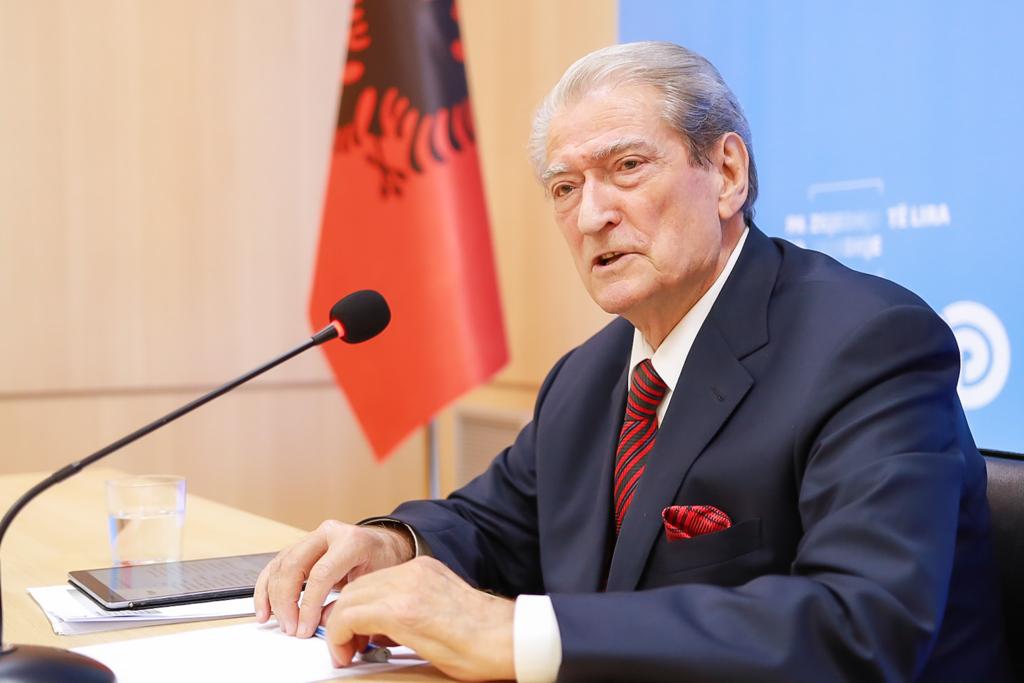One day after Berisha’s latest attack, Greek authorities finally debunk claims against Judge Irena Gjoka

Photo: Sali Berisha, leader of the Democratic Party.
Just 24 hours after Sali Berisha accused anti-corruption judge Irena Gjoka of having a criminal conviction in Greece, Greek judicial authorities have formally denied the allegation. In a written response sent to Albanian institutions, they confirmed that Judge Gjoka has no criminal record, closing the door on speculation that had circulated for over a year.
Why is this important: The timing of the Greek response weakens Berisha’s latest offensive against the judiciary and reinforces concerns that such accusations are being weaponized to intimidate judges involved in his corruption case. It also marks a rare instance where a foreign authority directly contradicts a public claim by a leading Albanian political figure.
Context: On May 5, after appearing at SPAK to fulfill court-mandated reporting conditions, Berisha launched a harsh personal attack on Special Court judge Irena Gjoka. He claimed she was convicted by a Greek court in Ioannina in the early 2000s for falsifying documents and hiding her past.
“This monster… was convicted in Greece for forgery, and instead of serving a sentence, she was promoted by Edi Rama to lead the Special Court,” Berisha said.
“Her decisions are null. She is immoral, a repeat offender, and a disgrace to the judiciary.”
Berisha’s lawyer, Klodiana Gjyzari, reinforced the accusation, stating that the information came from Fredi Beleri, who allegedly found it in a Greek newspaper and obtained court documents via administrative channels.
However, the day after Berisha’s claims, Greek judicial authorities responded through official channels. In a written document sent to Albania’s General Prosecutor’s Office, they categorically denied that Judge Gjoka had ever been convicted, investigated, or charged in Greece.
They confirmed that:
- No records exist under Gjoka’s current or former surnames (Gjoka, Shpata, Maneku).
- No judicial proceedings have ever been registered against her in any Greek court.
The Greek response directly contradicts the document shared by Berisha and his team, effectively putting to rest more than a year of speculation that had circulated in both Albanian and Greek media.
The judge reacts: Judge Gjoka dismissed Berisha’s accusations as baseless and politically motivated. Speaking to BIRN, she described the claims as a “coordinated attempt to intimidate and obstruct” her work on sensitive corruption and organized crime cases.
“These attacks are meant to delegitimize important judicial decisions involving high-profile figures,” she said, adding that she had formally submitted all Greek documents proving her clean legal status.
Institutions react cautiously: Despite the Greek denial, Albania’s General Prosecutor’s Office confirmed it has not yet closed its internal verification process. The background check on Judge Gjoka began in May 2024 under the decriminalization law and remains officially open.
Officials stated that another formal request would be sent to Greek authorities seeking further verification of the specific court ruling Berisha referenced.
The High Justice Inspector (ILD) also said it would review the matter in line with legal procedures.
Background: Judge Irena Gjoka has served in Albania’s judiciary since 1993, including roles in Fier and the Serious Crimes Court. She has been a judge at the Special Court for Corruption and Organized Crime (GJKKO) since 2019.
Berisha, currently under investigation in the “Partizani” corruption case, has repeatedly attacked members of the judiciary. His campaign against Gjoka mirrors past efforts to discredit prosecutors and judges overseeing cases tied to him or his political allies.
What’s next: While institutions in Albania continue their formal checks, Greece’s statement significantly undercuts Berisha’s narrative. For now, the evidence from Athens appears conclusive: Judge Irena Gjoka has no conviction in Greece.
Yet the case illustrates how fragile judicial integrity can be in the face of coordinated political pressure—and how crucial outside confirmation can be in dispelling misinformation.


